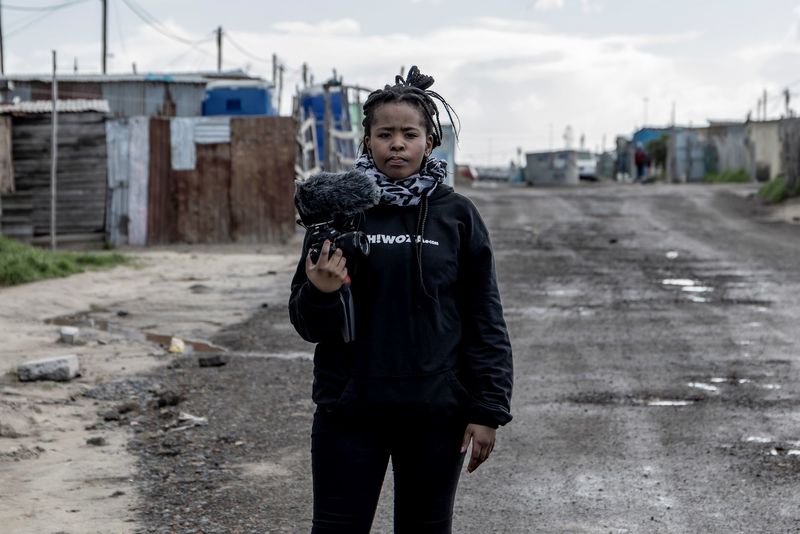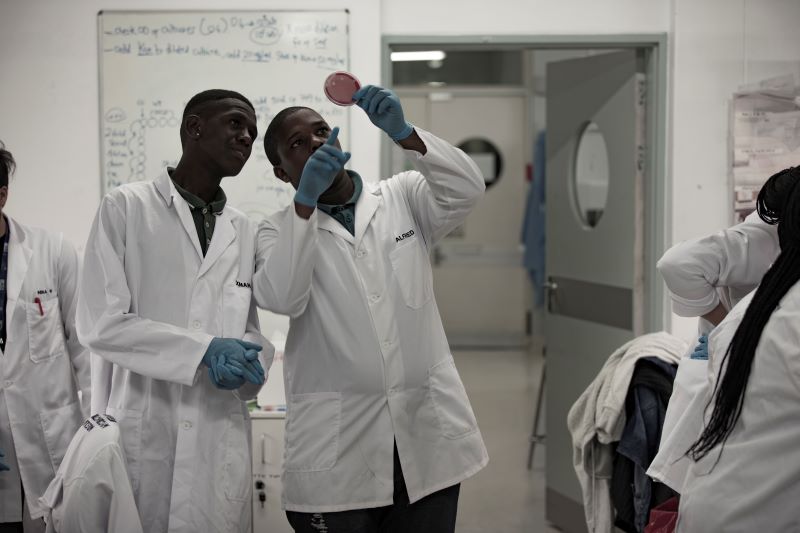Youth bring community stories to bear
16 July 2020 | Story Nobhongo Gxolo. Photos Supplied. Read time 6 min.
A team of young videographers participating in Eh!woza’s unique blend of biomedical research workshops and skills development through media training have focused their lenses on the impact of COVID-19 in Khayelitsha, which has one of the highest tuberculosis (TB) rates in the world.
Eh!woza’s inaugural project engaged high school learners on TB research driven by the University of Cape Town’s (UCT) Institute of Infectious Disease and Molecular Medicine (IDM).
The interactive science workshops hosted by the organisation exposed learners to renowned academics, and postgraduates and postdoctoral fellows from the IDM. This also provided a space for facilitators to learn from engaging with learners in a theoretical component coupled with practical lab experiments.
Operating at the intersection of public engagement, youth education, advocacy, and skills development, Eh!woza was founded by Dr Anastasia Koch (managing director), Ed Young (conceptual/visual artist), Bianca Masuku (junior research fellow at the Centre for Innovation in Learning and Teaching) and Professor Digby Warner (from the SAMRC/NHLS/UCT Molecular Mycobacteriology Research Unit and full member of the IDM).
“It was important for us to offer a sense that there was work being done around this very big problem [TB].”
“It was important for us to offer a sense that there was work being done around this very big problem [TB] – in a biomedical sense – and for the learners to be provided with the skills, access to equipment and knowledge, and a platform to reflect on the social and personal impact of this disease via film and media,” said Koch.
“While it sounds a bit trite, by investing in the youth, there is potential to change future generations.”

Addressing the impact of COVID-19
With the learner workshops currently on a COVID-19-enforced pause, it was important for Eh!woza to adapt to and address the impact of COVID-19 in their content-production process.
“We became acutely aware that information would be needed and that there was not much going out early in the pandemic that was in isiXhosa and relevant and accessible to people living in Khayelitsha,” Koch said.
So, after producing four public service announcements featuring Samuel Flans (Innocent Muziq), providing advice advocated by the World Health Organization, the team decided to shift to documenting people’s experiences of and feelings toward the pandemic.
The young Eh!woza participants were the engines behind a series of short documentaries, recently released in collaboration with The Bhekisisa Centre for Health Journalism and aired on News24, that explore the impact of COVID-19 on the neighbourhood of Makhaza in Khayelitsha.
Three videos produced by Eh!woza trainees and media workshop facilitators, Samuel Flans, Alfa Fiphaza and Abongile Njamela, have been released thus far. Makhaza 2020 and COVID Fears describe the thoughts and fears of community members surrounding the impact of COVID-19. The newest film, COVID Evictions, examines the recent forced expulsions by the City of Cape Town in the communities of eMpolweni and eThembeni in Khayelitsha and how this intersects with COVID-19.

Collaboration is key
Getting to a point where the youth were capable and skilled enough to produce quality videos has been a seven-year journey.
Eh!woza’s pilot project, a documentary produced by Young that explored learners’ thoughts on TB, was well received and formed the pilot for a successful application to the Wellcome Trust for an International Engagement Award in 2014.
Starting out as an “informal collaboration between local artists and scientists”, Koch acknowledged that collaboration between researchers and artists was always going to be difficult.
“What often happens in public engagement is that biomedical researchers recruit or commission artists for a specific piece of work with a particular brief. This sets up an imbalance in terms of collaboration. We wanted to move away from that model and value both fields and ways of thinking in the same way from the start.”
Coming from different backgrounds, she noted, sometimes meant a different way of understanding language.
“The dissonance and differences have been really productive, especially when they started to synergise.”
“Research … for me is hypothesis-driven, while for Ed it’s very exploratory. The dissonance and differences have been really productive, especially when they started to synergise.”
From informal collab to independent NPO
Six months ago, Eh!woza transitioned into an independent non-profit organisation (NPO) that will maintain close ties to the IDM and UCT. This is as a result of recently being awarded the Wellcome Trust Discretionary Award in Public Engagement.
Koch described the transition as: “Transformational … a huge shift for us. It has come with a lot more freedom but also a lot more responsibility.”
Collaboration, a cornerstone of Eh!woza, is also how they’re growing their footprint; networking is a deliberate path they are pursuing. The NPO’s process recognises and highlights all participants and everyone it works with as collaborators and co-producers. It was this way of working that led to young people from previous projects becoming trainees who were capable of producing the near-independent short documentaries which Young edited with final touches.
“This is really important to us in terms of capacity development and growing people,” said Koch.
“Our approach in engaging with people recognises that everyone we work with has something to teach us – and the world.”
 This work is licensed under a Creative Commons Attribution-NoDerivatives 4.0 International License.
This work is licensed under a Creative Commons Attribution-NoDerivatives 4.0 International License.
Please view the republishing articles page for more information.
UCT’s response to COVID-19
COVID-19 is a global pandemic that caused President Cyril Ramaphosa to declare a national disaster in South Africa on 15 March 2020 and to implement a national lockdown from 26 March 2020. UCT is taking the threat of infection in our university community extremely seriously, and this page will be updated with the latest COVID-19 information. Please note that the information on this page is subject to change depending on current lockdown regulations.
Minister of Health, Dr Joe Phaahla, has in June 2022 repealed some of South Africa’s remaining COVID-19 regulations: namely, sections 16A, 16B and 16C of the Regulations Relating to the Surveillance and the Control of Notifiable Medical Conditions under the National Health Act. We are now no longer required to wear masks or limit gatherings. Venue restrictions and checks for travellers coming into South Africa have now also been removed.
Read the latest document available on the UCT policies web page.
Campus communications
2022
UCT Community of Hope Vaccination Centre
On Wednesday, 20 July, staff from the University of Cape Town’s (UCT) Faculty of Health Sciences came together with representatives from the Western Cape Government at the UCT Community of Hope Vaccination Centre at Forest Hill Residence to acknowledge the centre’s significance in the fight against COVID-19 and to thank its staff for their contributions. The centre opened on 1 September 2021 with the aim of providing quality vaccination services to UCT staff, students and the nearby communities, as well as to create an opportunity for medical students from the Faculty of Health Sciences to gain practical public health skills. The vaccination centre ceased operations on Friday, 29 July 2022.
With the closure of the UCT Community of Hope Vaccination Centre, if you still require access to a COVID-19 vaccination site please visit the CovidComms SA website to find an alternative.
“After almost a year of operation, the University of Cape Town’s (UCT) Community of Hope Vaccination Centre, located at the Forest Hill residence complex in Mowbray, will close on Friday, 29 July 2022. I am extremely grateful and proud of all staff, students and everyone involved in this important project.”
– Vice-Chancellor Prof Mamokgethi PhakengWith the closure of the UCT Community of Hope Vaccination Centre, if you still require access to a COVID-19 vaccination site please visit the CovidComms SA website to find an alternative.
Frequently asked questions
Global Citizen Asks: Are COVID-19 Vaccines Safe & Effective?
UCT’s Institute of Infectious Disease and Molecular Medicine (IDM) collaborated with Global Citizen, speaking to trusted experts to dispel vaccine misinformation.
If you have further questions about the COVID-19 vaccine check out the FAQ produced by the Desmond Tutu Health Foundation (DTHF). The DTHF has developed a dedicated chat function where you can ask your vaccine-related questions on the bottom right hand corner of the website.
IDM YouTube channel | IDM website
“As a contact university, we look forward to readjusting our undergraduate and postgraduate programmes in 2023 as the COVID-19 regulations have been repealed.”
– Prof Harsha Kathard, Acting Deputy Vice-Chancellor: Teaching and Learning
We are continuing to monitor the situation and we will be updating the UCT community regularly – as and when there are further updates. If you are concerned or need more information, students can contact the Student Wellness Service on 021 650 5620 or 021 650 1271 (after hours), while staff can contact 021 650 5685.




















